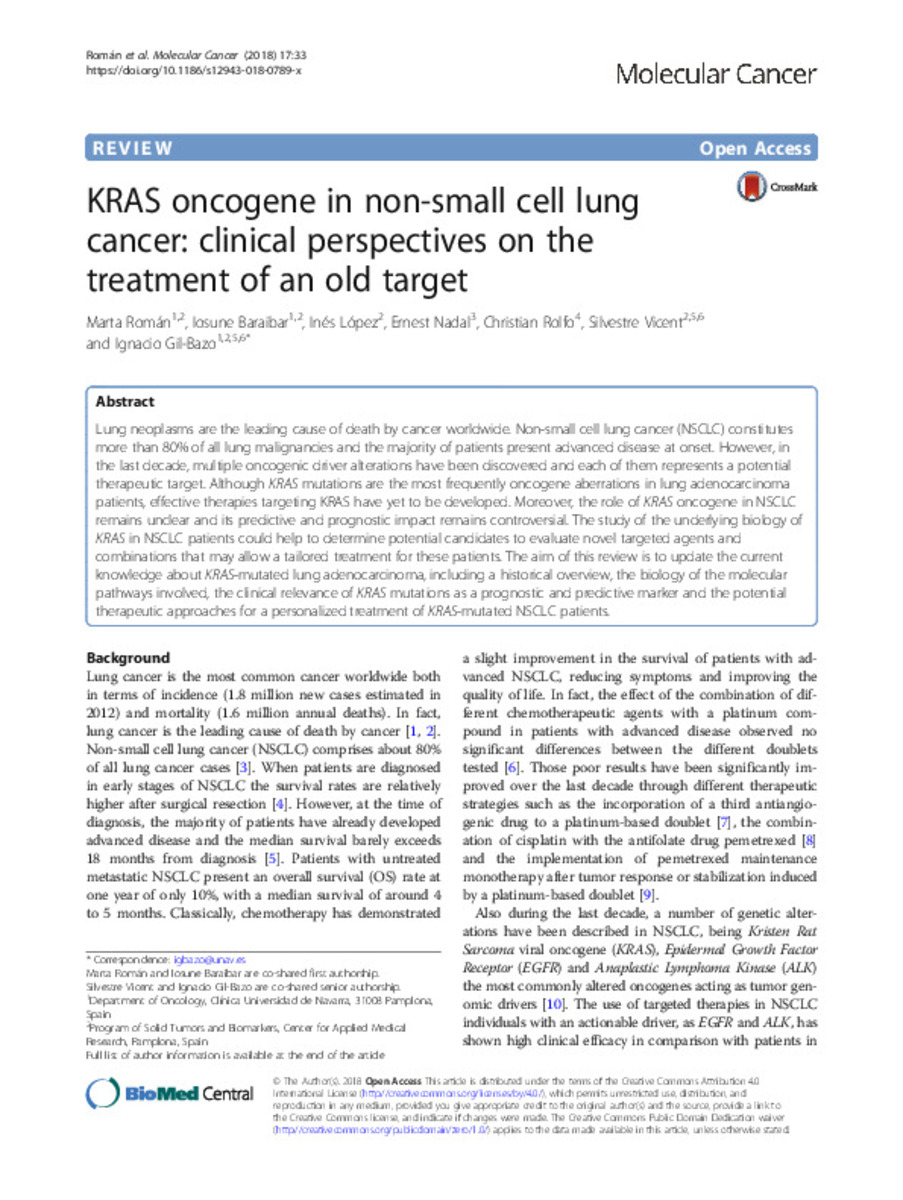Full metadata record
| DC Field | Value | Language |
|---|---|---|
| dc.creator | Román, M. (Marta) | - |
| dc.creator | Baraibar-Argota, I. (Iosune) | - |
| dc.creator | Lopez, I. (Inés) | - |
| dc.creator | Nadal, E. (Ernest) | - |
| dc.creator | Rolfo, C. (Christian) | - |
| dc.creator | Vicent, S. (Silvestre) | - |
| dc.creator | Gil-Bazo, I. (Ignacio) | - |
| dc.date.accessioned | 2022-10-19T07:06:14Z | - |
| dc.date.available | 2022-10-19T07:06:14Z | - |
| dc.date.issued | 2018 | - |
| dc.identifier.citation | Román, M. (Marta); Baraibar-Argota, I. (Iosune); Lopez, I. (Inés); et al. "KRAS oncogene in non-small cell lung cancer: clinical perspectives on the treatment of an old target". MOLECULAR CANCER. 17 (1), 2018, 33 | es_ES |
| dc.identifier.issn | 1476-4598 | - |
| dc.identifier.uri | https://hdl.handle.net/10171/64484 | - |
| dc.description.abstract | Lung neoplasms are the leading cause of death by cancer worldwide. Non-small cell lung cancer (NSCLC) constitutes more than 80% of all lung malignancies and the majority of patients present advanced disease at onset. However, in the last decade, multiple oncogenic driver alterations have been discovered and each of them represents a potential therapeutic target. Although KRAS mutations are the most frequently oncogene aberrations in lung adenocarcinoma patients, effective therapies targeting KRAS have yet to be developed. Moreover, the role of KRAS oncogene in NSCLC remains unclear and its predictive and prognostic impact remains controversial. The study of the underlying biology of KRAS in NSCLC patients could help to determine potential candidates to evaluate novel targeted agents and combinations that may allow a tailored treatment for these patients. The aim of this review is to update the current knowledge about KRAS-mutated lung adenocarcinoma, including a historical overview, the biology of the molecular pathways involved, the clinical relevance of KRAS mutations as a prognostic and predictive marker and the potential therapeutic approaches for a personalized treatment of KRAS-mutated NSCLC patients. | es_ES |
| dc.description.sponsorship | MR was supported by ADA and FPU15/00173 fellowships. SV was supported by the Spanish Ministry of Economy and Competitiveness (MINECO, SAF2013-46423-R), the European Commission (S.V., 618312 KRASmiR FP7-PEOPLE-2013-CIG), the Worldwide Cancer Research (16-0224) and the Fundación La Caixa-FIMA agreement. SV and IGB were supported by a grant (RD12/0036/0040) from Red Temática de Investigación Cooperativa en Cáncer, Instituto de Salud Carlos III, Spanish Ministry of Economy and Competitiveness & European Regional Development Fund “Una manera de hacer Europa” and cofunded by FEDER funds/European Regional Development Fund (ERDF). IGB was also supported by two grants from Instituto de Salud Carlos III (PI11/00976 and PI15/02223). | es_ES |
| dc.language.iso | eng | es_ES |
| dc.publisher | BMC | es_ES |
| dc.rights | info:eu-repo/semantics/openAccess | es_ES |
| dc.subject | KRAS | es_ES |
| dc.subject | Lung cancer | es_ES |
| dc.title | KRAS oncogene in non-small cell lung cancer: clinical perspectives on the treatment of an old target | es_ES |
| dc.type | info:eu-repo/semantics/article | es_ES |
| dc.description.note | This article is distributed under the terms of the Creative Commons Attribution 4.0 International License (http://creativecommons.org/licenses/by/4.0/), which permits unrestricted use, distribution, and reproduction in any medium, provided you give appropriate credit to the original author(s) and the source, provide a link to the Creative Commons license, and indicate if changes were made. The Creative Commons Public Domain Dedication waiver (http://creativecommons.org/publicdomain/zero/1.0/) applies to the data made available in this article, unless otherwise stated | es_ES |
| dc.identifier.doi | 10.1186/s12943-018-0789-x. | - |
| dadun.citation.number | 1 | es_ES |
| dadun.citation.publicationName | MOLECULAR CANCER | es_ES |
| dadun.citation.startingPage | 33 | es_ES |
| dadun.citation.volume | 17 | es_ES |
Files in This Item:
Statistics and impact
Items in Dadun are protected by copyright, with all rights reserved, unless otherwise indicated.






